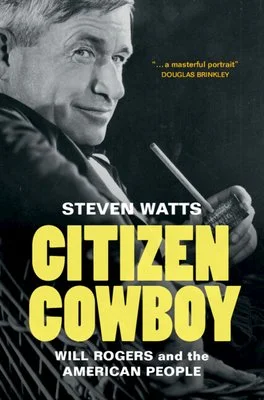We are very pleased to welcome Dr. Steven Watts to Skylark to discuss his new biography, Citizen Cowboy: Will Rogers and the American People.
Will Rogers helped audiences cope with the dislocations of a modernizing world, according to this perceptive biography. Growing up in what’s now Oklahoma, Rogers pined for the glory days of the open plains that were quickly being divvied up into homesteads and farms. Seeing Buffalo Bill’s Wild West Show in 1893 sparked the realization that “riding, roping, and cowboys” could be commercialized and inspired Rogers to join the vaudeville circuit performing lariat tricks. His ability to bridge the Victorian and modern ages was core to his appeal, Watts argues, suggesting that by playing rustic cowboys in early western films, Rogers injected nostalgia for the bygone frontier into the medium. Rogers also burnished his everyman persona in a weekly syndicated column that skewered urbanization and the ascendant white-collar class (in response to a report of job openings on the Wall Street stock exchange, Rogers quipped, “No conscience necessary; all you need is six hundred thousand dollars, but you get it back the first good day”). The liberal quotations from Rogers’s personal letters and public writings attest to his charisma, and Watts’s incisive historical contextualization illustrates how, for Rogers’s audience, he acted “as a beloved guide across shifting social terrain.” The result is an immersive look at a beloved performer negotiating a country in transition.
Steven Watts, Professor Emeritus at the University of Missouri, is a historian and writer who has charted the sweeping evolution of American culture in several highly praised books. His biographies of major figures—Henry Ford, Walt Disney, Dale Carnegie, Hugh Hefner, John F. Kennedy, and now Will Rogers—has explored the shaping of a modern American value-system devoted to consumerism, self-fulfillment, leisure, and personality. Two earlier books on the early republic era examined the shift from an older society of republican virtue to a 19th -century Victorian era devoted to self-control, individual character, and the self-made man.
Watts’ books have been translated into German, Spanish, Chinese, Japanese, Russian, Korean, Polish, and Romanian. They have been reviewed in nearly every major newspaper and magazine in the United States, including the New York Times, Washington Post, Los Angeles Times, New York Review of Books, Chicago Tribune, Boston Globe, San Francisco Chronicle, Newsday, Baltimore Sun, Philadelphia Inquirer, Denver Post, USA Today, New Republic, Commentary, Harper’s, Economist, Reason, and many others. Watts has written numerous essays for public affairs journals such as The Atlantic, National Review, The Nation, American Spectator, Chronicle of Higher Education, Newsweek, The Federalist, Salon, and The American Mind. He has been involved in many media projects, including several films for PBS, the History Channel, and documentary venues in Germany and Brazil. He also has appeared in a variety of programs on CBS, NBC, CNBC, NPR, Fox, Fox News, C-Span, Bloomberg News, MSNBC, Telemundo, and the BBC.




